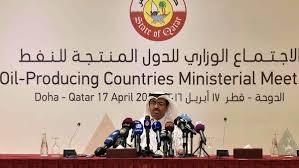
Built & non-Built Environment Professionals Meeting Place
April 18 2016
As I highlighted it recently here (Ref. my earlier article OPEC & non-OPEC countries in Doha) and in several other of my national and international contributions, renewed tensions between Saudi Arabia and Iran have compromised the conclusion of a binding agreement on the freezing of the oil production on April 17, 2016 and no date has been set for a new meeting. The world's key oil producing countries failed to agree on the Freezing of the Oil Production . And therefore they did not deliver any concrete agreement to this end at their ministerial meeting on Sunday amid disagreements on the wording of the agreement. Avoiding hasty statements, whilst studying the evolution of prices in the energy sector, one should stick to basics in addition to geo-strategic issues.
1.-. The International Agency of Energy (IEA) had previously warned that a Doha agreement would have a limited impact on the offer and OPEC had informed, before the meeting, that oversupply could further escalate. The Organization has also revised downward its forecast for growth of world demand for 2016. One should remember that it was not a meeting for a decrease in production but only for a freeze, knowing that Russia and Saudi Arabia had achieved during the first quarter of 2016, an unequalled production level. Thus, fifteen countries members and non-members of the OPEC, of whom major producers such as Saudi Arabia and Russia, represented in Doha on 17 April 2016 have failed to, agree on a freeze of production to support the current low prices.
According to the Russian news agency Ria-Novosti, Saudi Arabia demanded the participation of all OPEC countries to the mechanism and as per AFP and Reuters (17/04/2016), Ministers of the countries members of the Organization wanted first an internal agreement before negotiating with the non-OPEC producer countries. The Qatari oil Minister, Mohammed Ibn Saleh Al-Sada seconded by his counterparts from Nigeria and the Sultanate of Oman commented in a press conference that "the meeting reached a result which we all need more time for more consultations and talks."
2 – For years, there exists some mistrust between Russia whose production reached a level never matched until between 2015 and 2016 and Saudi Arabia and this agreement is against nature. This is happening in the absence of the United States of America which is one of the largest producers and soon one of the world's largest exporter, Iran whose Minister was not present at the meeting and having previously warned it intention to first and foremost reach a production of 4 million barrels per day prior to considering a freeze on its production once that threshold was reached. Iraq is also a specific case, and a direct competitor to Saudi Arabia with a lower production cost of 20%, and then Libya who are in desperate need for funds.
The fundamental determinant of the demand for oil which is the growth of the world economy; the International Monetary Fund (IMF) in its latest report of April 12, 2016, has revised downward its prospects from 3.1 to 3.2% for 2016 to a forecast of 3.4% and 3.5% in 2017. The financial tensions in many oil-exporting countries reduce the capacity of these countries to mitigate the shock, resulting in a significant decline in their domestic demand. One has to be realistic, and not expecting a spectacular comeback, the equilibrium price of oil is basically determined by an agreement between the USA, not affected by this meeting and Saudi Arabia and to a lesser extent by the position of two other major producers, Iran and Iraq, both of whom are seeking to increase their production.
Also, after this meeting of April 17, 2016 failure, and before we go back to the basic fundamentals, whilst ensuring not to mislead the public opinion, it could safely be said that one should not expect a dramatic rise in the oil prices (it is over with prices of more than $90/100 a barrel). A new model of consumption therefore and energy power at the global level between 2020/2030 could be anticipated as opposed to the euphoric predictions of some Algerian experts whose thinking is always without the framework of a linear consumption model, and to already start preparing an economic transition tributary of the energy transition.
Algiers on April 18, 2016 - Professor, Expert International - Director of Studies Department energy/Sonatrach (1974/2007) - Dr Abderrahmane MEBTOUL ademmebtoul@gmail.com .